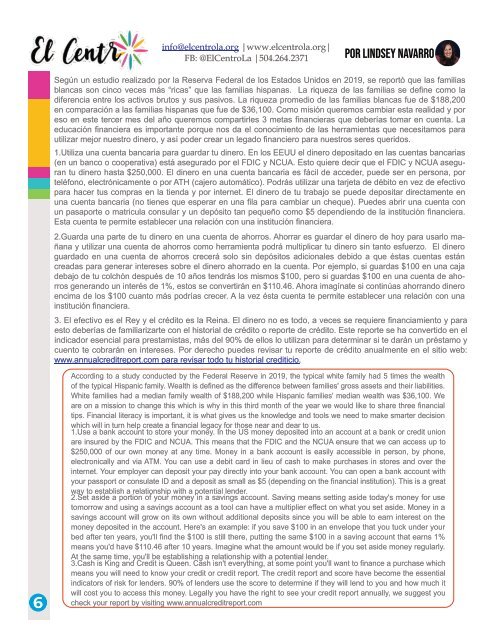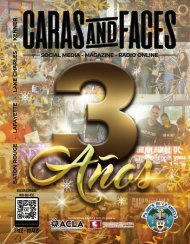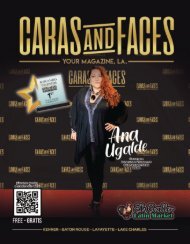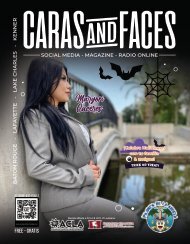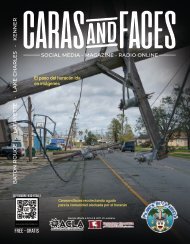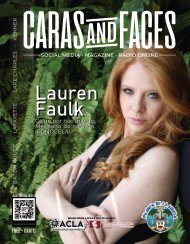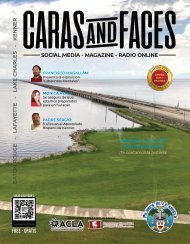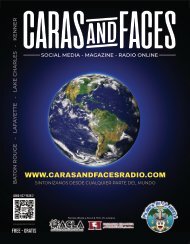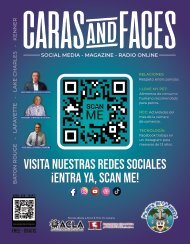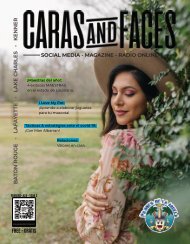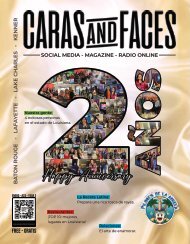Revista Marzo 2021
*Orgullo Latino *Vacúnate ante el covid19 *Consejos para elegir una mascota *Averigua porqué se conciben más bebés en navidad
*Orgullo Latino
*Vacúnate ante el covid19
*Consejos para elegir una mascota
*Averigua porqué se conciben más bebés en navidad
Create successful ePaper yourself
Turn your PDF publications into a flip-book with our unique Google optimized e-Paper software.
info@elcentrola.org |www.elcentrola.org|<br />
FB: @ElCentroLa |504.264.2371<br />
Según un estudio realizado por la Reserva Federal de los Estados Unidos en 2019, se reportó que las familias<br />
blancas son cinco veces más “ricas” que las familias hispanas. La riqueza de las familias se define como la<br />
diferencia entre los activos brutos y sus pasivos. La riqueza promedio de las familias blancas fue de $188,200<br />
en comparación a las familias hispanas que fue de $36,100. Como misión queremos cambiar esta realidad y por<br />
eso en este tercer mes del año queremos compartirles 3 metas financieras que deberías tomar en cuenta. La<br />
educación financiera es importante porque nos da el conocimiento de las herramientas que necesitamos para<br />
utilizar mejor nuestro dinero, y así poder crear un legado financiero para nuestros seres queridos.<br />
1. Utiliza una cuenta bancaria para guardar tu dinero. En los EEUU el dinero depositado en las cuentas bancarias<br />
(en un banco o cooperativa) está asegurado por el FDIC y NCUA. Esto quiere decir que el FDIC y NCUA aseguran<br />
tu dinero hasta $250,000. El dinero en una cuenta bancaria es fácil de acceder, puede ser en persona, por<br />
teléfono, electrónicamente o por ATH (cajero automático). Podrás utilizar una tarjeta de débito en vez de efectivo<br />
para hacer tus compras en la tienda y por internet. El dinero de tu trabajo se puede depositar directamente en<br />
una cuenta bancaria (no tienes que esperar en una fila para cambiar un cheque). Puedes abrir una cuenta con<br />
un pasaporte o matricula consular y un depósito tan pequeño como $5 dependiendo de la institución financiera.<br />
Esta cuenta te permite establecer una relación con una institución financiera.<br />
2. Guarda una parte de tu dinero en una cuenta de ahorros. Ahorrar es guardar el dinero de hoy para usarlo mañana<br />
y utilizar una cuenta de ahorros como herramienta podrá multiplicar tu dinero sin tanto esfuerzo. El dinero<br />
guardado en una cuenta de ahorros crecerá solo sin depósitos adicionales debido a que éstas cuentas están<br />
creadas para generar intereses sobre el dinero ahorrado en la cuenta. Por ejemplo, si guardas $100 en una caja<br />
debajo de tu colchón después de 10 años tendrás los mismos $100, pero si guardas $100 en una cuenta de ahorros<br />
generando un interés de 1%, estos se convertirán en $110.46. Ahora imagínate si continúas ahorrando dinero<br />
encima de los $100 cuanto más podrías crecer. A la vez ésta cuenta te permite establecer una relación con una<br />
institución financiera.<br />
3. El efectivo es el Rey y el crédito es la Reina. El dinero no es todo, a veces se requiere financiamiento y para<br />
esto deberías de familiarizarte con el historial de crédito o reporte de crédito. Este reporte se ha convertido en el<br />
indicador esencial para prestamistas, más del 90% de ellos lo utilizan para determinar si te darán un préstamo y<br />
cuento te cobrarán en intereses. Por derecho puedes revisar tu reporte de crédito anualmente en el sitio web:<br />
www.annualcreditreport.com para revisar todo tu historial crediticio.<br />
6<br />
According to a study conducted by the Federal Reserve in 2019, the typical white family had 5 times the wealth<br />
of the typical Hispanic family. Wealth is defined as the difference between families' gross assets and their liabilities.<br />
White families had a median family wealth of $188,200 while Hispanic families' median wealth was $36,100. We<br />
are on a mission to change this which is why in this third month of the year we would like to share three financial<br />
tips. Financial literacy is important, it is what gives us the knowledge and tools we need to make smarter decision<br />
which will in turn help create a financial legacy for those near and dear to us.<br />
1. Use a bank account to store your money. In the US money deposited into an account at a bank or credit union<br />
are insured by the FDIC and NCUA. This means that the FDIC and the NCUA ensure that we can access up to<br />
$250,000 of our own money at any time. Money in a bank account is easily accessible in person, by phone,<br />
electronically and via ATM. You can use a debit card in lieu of cash to make purchases in stores and over the<br />
internet. Your employer can deposit your pay directly into your bank account. You can open a bank account with<br />
your passport or consulate ID and a deposit as small as $5 (depending on the financial institution). This is a great<br />
way to establish a relationship with a potential lender.<br />
2. Set aside a portion of your money in a savings account. Saving means setting aside today's money for use<br />
tomorrow and using a savings account as a tool can have a multiplier effect on what you set aside. Money in a<br />
savings account will grow on its own without additional deposits since you will be able to earn interest on the<br />
money deposited in the account. Here's an example: if you save $100 in an envelope that you tuck under your<br />
bed after ten years, you'll find the $100 is still there, putting the same $100 in a saving account that earns 1%<br />
means you'd have $110.46 after 10 years. Imagine what the amount would be if you set aside money regularly.<br />
At the same time, you'll be establishing a relationship with a potential lender.<br />
3. Cash is King and Credit is Queen. Cash isn't everything, at some point you'll want to finance a purchase which<br />
means you will need to know your credit or credit report. The credit report and score have become the essential<br />
indicators of risk for lenders. 90% of lenders use the score to determine if they will lend to you and how much it<br />
will cost you to access this money. Legally you have the right to see your credit report annually, we suggest you<br />
check your report by visiting www.annualcreditreport.com


